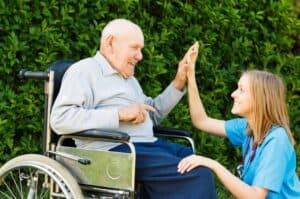
8 Memory Care Requirements That You Need to Consider Before Committing Your Loved One
Have you noticed a decline in cognitive and memory abilities as your loved one ages? In some individuals, this decline can be more pronounced, resulting

Imagine you wake up and you don’t know where you are. You panic and proceed to leave the premises as soon as possible. You don’t care if you are dressed or not and if you have shoes on or not. You just know that you want to go home where you feel safe with everything familiar around you at this very instant because you are scared, confused, and tired.
This is not the beginning of some horror novel, but it might be something your loved one has dementia experiences quite often. Taking care of an older adult with dementia can be highly challenging. Depending on the stage of their condition, caregiving could be a full-time job. Therefore, having someone you can rely on, at all times or for respite care, such as a reliable senior caregiver, is essential.
Naturally, the best senior care is individualized in the senior’s home or small group facilities, such as Amy’s Eden care homes. If you are looking after a loved one with dementia, this article might help you. It looks into ways to overcome the challenges of caring for people with cognitive impairment and how a senior caregiver can provide support.
Dementia is classified as a condition of memory decline in at least one cognitive function, such as language, visuospatial or executive function. This decline is considerable enough to interfere with everyday life and the habits of an alert person.

The early symptoms of dementia are occasional problems with thinking, remembering, and speaking. With the condition’s progression, these symptoms begin to appear more often.
Dementia is not just a disease. It’s a term used to describe a group of conditions with similar symptoms of cognitive decline but various causes. The following are conditions in which the brain cells are not functioning correctly.
These are the five most common types of dementia, but there are also other types, like mixed dementia, that exhibit shared symptoms with the types listed above but with a different cause.
Unfortunately, scientists aren’t entirely sure why some people develop dementia while others don’t. But they have discovered that people suffering from the following conditions are at a higher risk of dementia later in life.
Other factors like lifestyle habits, smoking, diet, and exercise may also influence our brain health.
One of the most distinctive features of this dementia is that it worsens with time. As this happens, your loved one can lose the ability to communicate coherently and become unable to tell you how they feel or what they want.
Seniors with progressive dementia ultimately lose their ability to be self-sufficient, leading to poor personal hygiene and bathroom habits. Additionally, they may develop difficulties swallowing. Hence, nourishing and hydrating can become complicated.
As a caregiver of a person with dementia, you may have already faced many challenges and realized that this task requires patience, understanding, and compassion. Here are some of the most common difficulties caregivers may face when caring for someone with dementia.
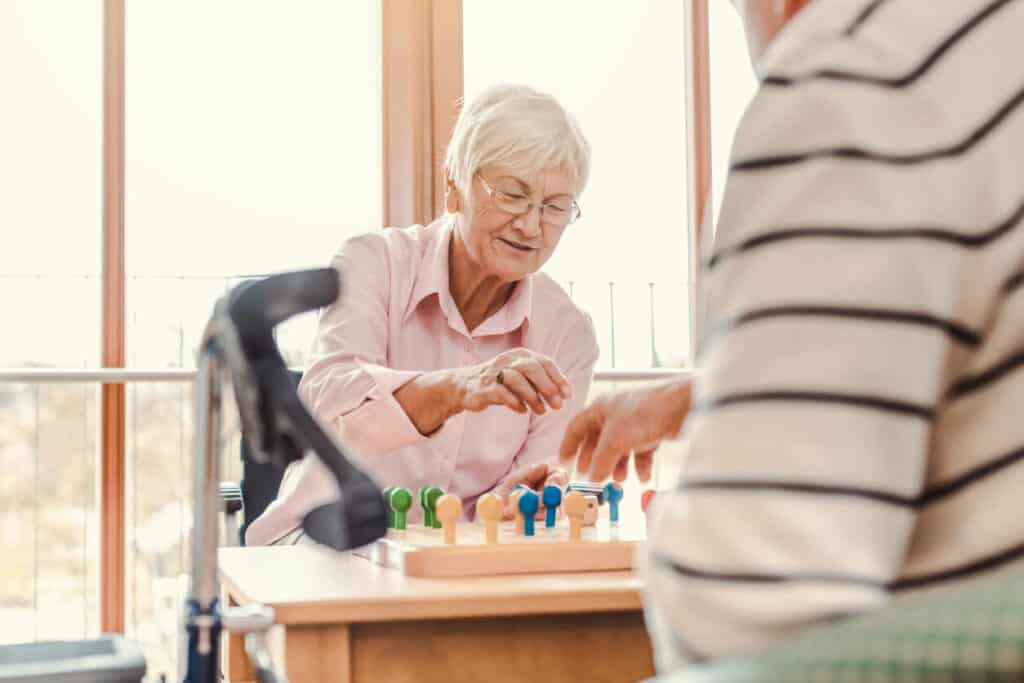
People with dementia often find it challenging to communicate effectively. It makes it arduous for their caregivers to understand their needs and desires. Since this condition affects the part of the brain responsible for language and speech, it may be hard for seniors to find the right word to express themselves, making them feel frustrated and confused.
A range of behavioral changes, including agitation, aggression, and restlessness, are prevalent symptoms of this condition. These behaviors can be problematic for caregivers and require specialized dementia care training and support. Amy’s Eden has professional caregivers to offer you steady and reliable assistance.
Memory loss is the most common symptom of dementia, making it difficult for the person to remember important information. This includes their daily routine, medication schedule, and personal history. Therefore, the caregiver must remember to administer their medication, provide meals, and follow their routine. Memory loss may cause a lot of confusion to the person who has dementia to the point that they may not recognize their caregiver or other family members.
People with dementia may have difficulty performing personal care tasks such as bathing, dressing, and grooming. Caregivers may need to assist with these, which can be physically and emotionally demanding as it is a constant, 24-hour effort.
Seniors with dementia may be at an increased risk of accidents and injuries, such as falls or cuts. Because of their confusion and memory loss, they are prone to wandering and getting lost. Caregivers need to take steps, such as using a wearable tracking device, to ensure the senior’s safety and prevent accidents.
Caring for a person with dementia is often emotionally challenging, as caregivers may experience guilt, sadness, frustration, and burnout. Therefore, dementia caregivers can benefit from a support system. Families, healthcare professionals, or support groups can provide respite and occupational expertise to lighten the burden of the primary caregiver.
Caregivers need to take care of their own physical and emotional needs to provide the best quality care for the person with dementia.
Other caregivers’ well-being challenges may include:
It is easy to feel trapped in everyday responsibilities, especially as your loved one’s condition progresses. You may find yourself attending to them in every aspect of their life. At the same time, you will have heartwarming moments of shared love and experience the satisfaction of giving and tending to a loved one.
However, it is more difficult to notice and cherish these moments when feeling overwhelmed and on the brink of burnout. That’s why having a professional caregiver you can trust and depend on is a good idea.
Here are some ways in which you can get support from a professional caregiver for your loved one with dementia:
A caregiver can assist with activities of daily living, such as bathing, dressing, grooming, and toileting, ensuring the senior’s personal hygiene needs are met.
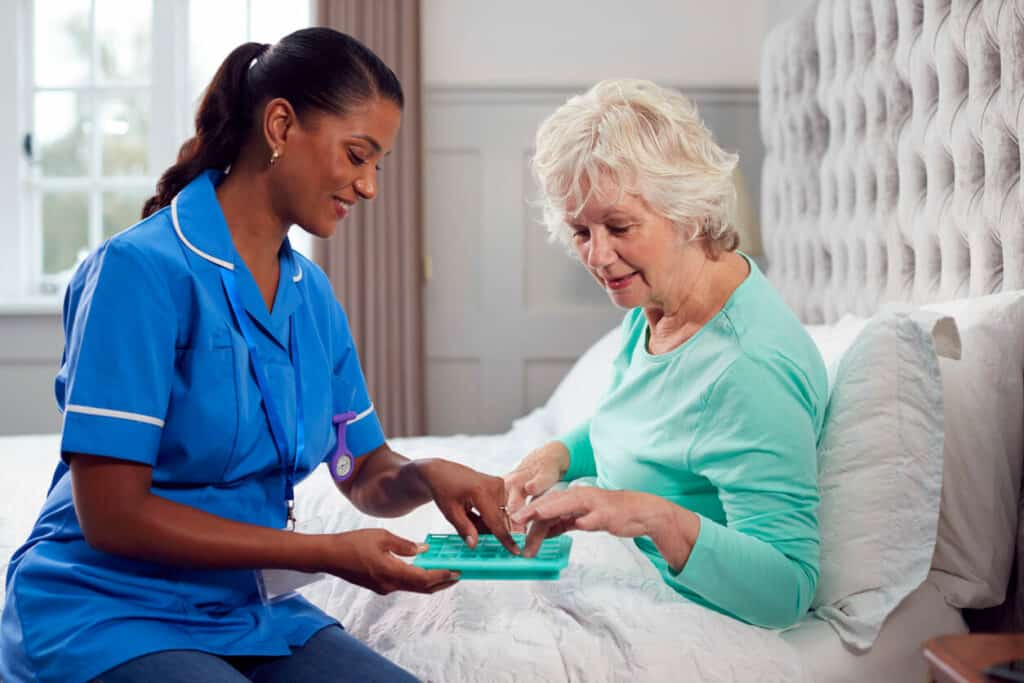
Medication reminders and overseeing the medication process ensure that the senior takes their prescriptions at the right times and in the correct dosages.
A safe environment is of utmost importance, and a senior caregiver can identify and address potential hazards, thus preventing falls and monitoring the senior’s overall safety and well-being.
Engaging your loved one in activities that promote their cognitive stimulation and mental focus, such as puzzles, memory games, and reminiscing exercises, can help maintain cognitive function as long as possible.
Socialization, emotional contact, and conversation are highly beneficial to cognitive abilities. Listening to your beloved senior’s concerns, engaging them in a conversation, and offering empathy and reassurance can slow down the condition’s progression.
A professional caregiver can assist with meal planning, grocery shopping, and meal preparation. These are essential for healthy nutrition and allow you to serve balanced menu options that cater to your senior’s dietary restrictions or preferences.
Going to medical appointments, social outings, and other necessary errands can become more accessible and convenient if a caregiver assists with transportation. Seniors must have access to such essential services to promote an active social life.
A professional caregiver can allow you to rest, recharge, and take over your caregiving responsibilities temporarily. This gives you time as a family caregiver to attend to your own self-care needs.
Caregivers can help document and report any changes in your beloved senior’s condition, including their symptoms and behaviors. This information helps doctors, family members, and the healthcare team develop more effective treatment programs in the future.
Establishing a clear and thorough communication path with healthcare providers, sharing observations and concerns, and ensuring that the senior’s medical needs are addressed appropriately are integral to maintaining their overall health.
Dementia caregivers are trained and experienced in providing care for individuals with cognitive disorders, and their expertise can help alleviate the challenges of caregiving, enhance the quality of life of your loved one, and provide you the much-needed support as a family caregiver.
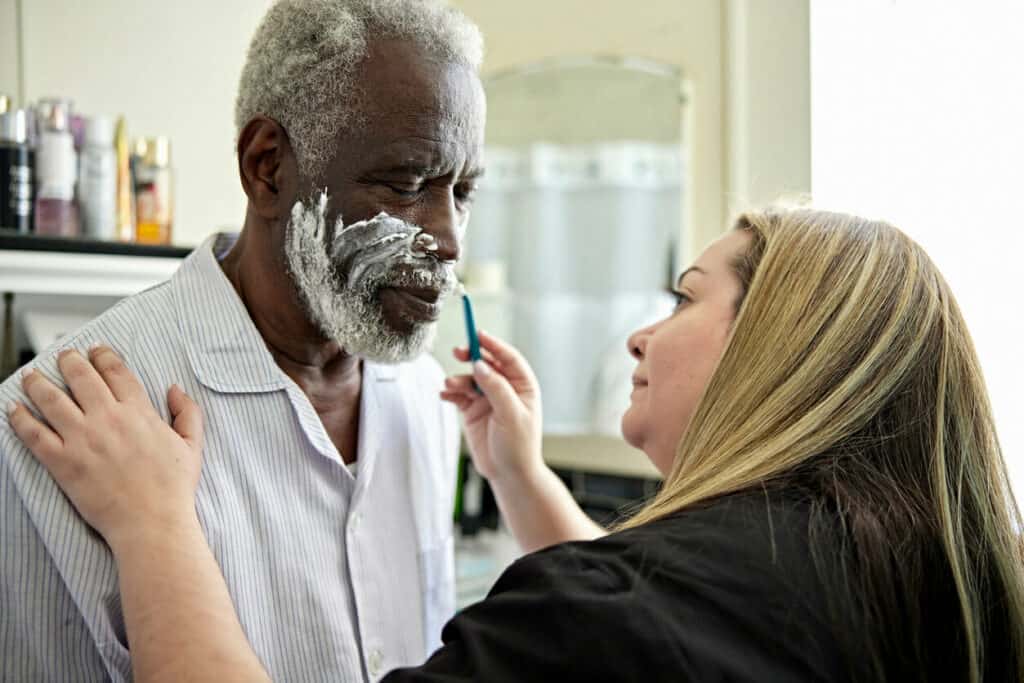
Working with a senior caregiver can benefit you as a family caregiver. They can offer guidance and information about the challenges dementia poses for your loved one and for you as their family caregiver. They can help you prepare for what to expect and how to respond in different circumstances to effectively provide long-term support for your loved one. Here are some ways caregivers can offer guidance and support:
Caregivers can educate your family about dementia, its progression, and the common symptoms associated with different stages of the condition. This knowledge can help you better understand what your loved one is experiencing and prepare you for the challenges ahead.
You can learn practical strategies and techniques to manage specific symptoms and behaviors people with dementia manifest. Professional caregivers can guide you on approaching communication if your loved one can no longer verbally express themselves. They can also teach you how to cope with behavioral disturbances associated with the disease, such as agitation and wandering.
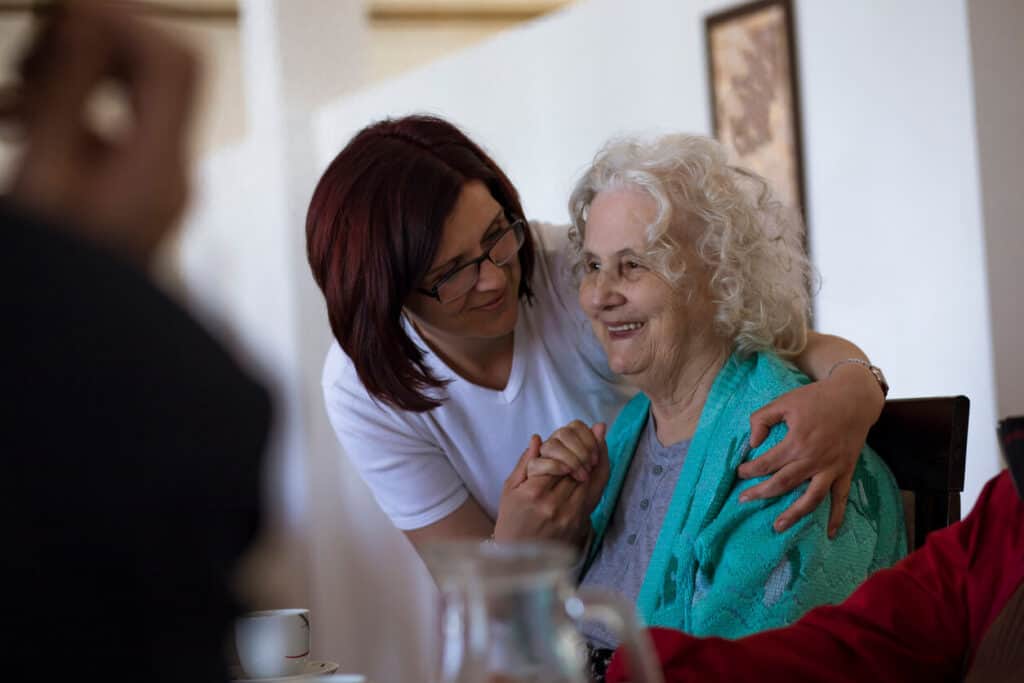
Caregivers can help you ensure a safe environment for your family member with dementia. It could mean discussing home modifications, such as removing extra furniture, rugs, and slippery surfaces, installing grab bars, and providing tips to prevent accidents, falls, or wandering.
Establishing a consistent daily routine and structure for your loved one is essential for their well-being. A senior caregiver can guide you through creating a predictable schedule to help reduce confusion and anxiety and enhance the senior’s sense of safety.
Taking care of yourself as a family member of a senior with dementia is important. A senior caregiver can guide you in managing stress and avoiding burnout. They can also advise you when to seek respite care to ensure you take care of your physical and emotional well-being.
They can also offer emotional support by listening to your concerns with empathy. A professional caregiver can help you navigate the emotional impact of dementia and teach you coping strategies and stress management skills.
Senior caregivers can direct you and your family to relevant support resources, such as local dementia support groups, community organizations, and online website forums. These resources allow you to reach out to others facing similar challenges, get answers to healthcare questions, and share experiences and advice.
Coordinating healthcare services can often be tricky, time-consuming, and frustrating. Caregivers can connect you with reliable healthcare providers, prepare you for or accompany you to a medical visit, and facilitate communication with the healthcare team. Additionally, the senior caregiver can update you regularly about your beloved’s condition. This way, you can stay informed at all times.
Caregivers can assist you in planning for the future. They can help you discuss and document your loved one’s wishes regarding end-of-life care, legal matters, and financial considerations.
By offering know-how and counseling in these various aspects, senior caregivers can empower you as a family caregiver to better care for your loved one with dementia and navigate the challenges of the condition much more effectively.
Caregivers must possess a combination of qualities and skills that will enable them to look after and support aging people with dementia. When searching for the best caregiver for your beloved senior, you should keep these attributes in mind.
While specific skills and experience are crucial, the combination of the qualities above can genuinely set the best senior caregivers apart, allowing them to provide exceptional care, support, and companionship to seniors.
If you are considering reaching out to a senior caregiver, Amy’s Eden services will make your life easier. When selecting our caregivers, we are not only looking for the qualities and skills listed above. We also do background checks and provide caregiving education and training. Therefore, our senior caregivers are professional, trustworthy, and reliable.
Whether you need an in-home caregiver or want to check one of Amy’s Eden’s assisted homes, contact us to schedule a free assessment of your loved one’s and your family’s needs.
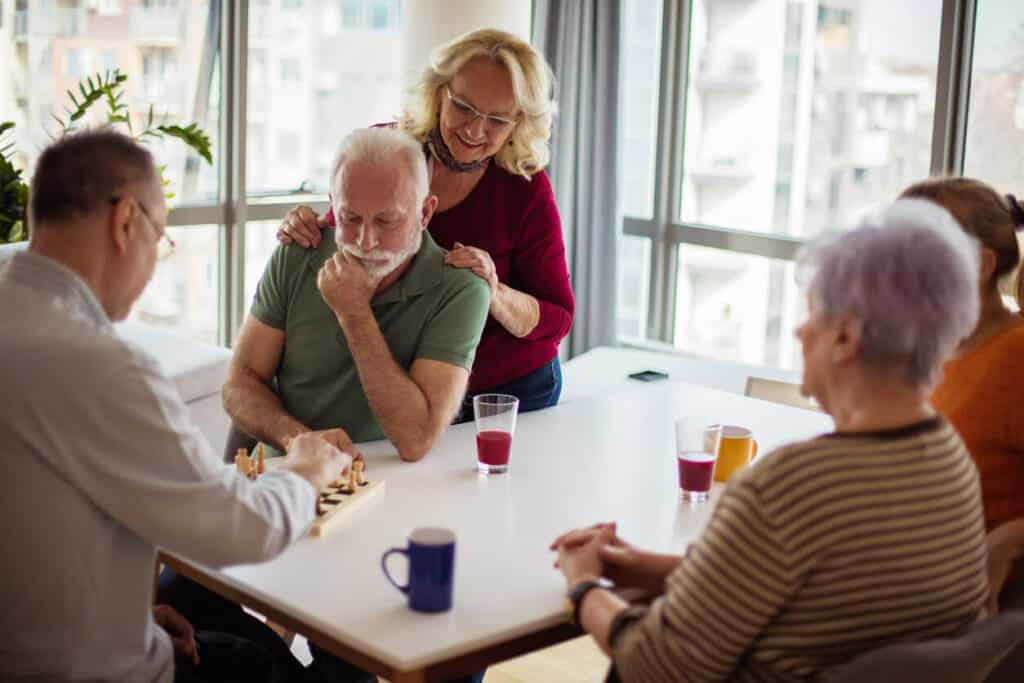
Caring for a senior with a diagnosis of dementia can be exhausting, challenging, and depressing. As a family caregiver, you should consider enlisting the help of your family members, friends, and dementia caregivers.
Senior caregivers play a crucial role in enhancing the quality of life of seniors with dementia. Their expertise, compassion, and dedication contribute to providing personalized and holistic care, promoting seniors’ comfort, safety, and well-being throughout the progression of the disease.
Senior caregivers can assist you in caring for your loved one in more than a few options. They can help you create a safe and secure living environment, aid your senior family member with their daily activities, offer medication reminders, keep track of their care plan, and observe their state of health and behavior.
With the help of a senior caregiver, your loved one can engage in social interactions, slow the decline of their memory skills, and receive emotional and companionship support.
Senior caregivers benefit you and the whole family by teaching you how to manage your stress levels, what to expect from your beloved’s condition, and how to prepare for the future.
Sources:
https://www.ncbi.nlm.nih.gov/pmc/articles/PMC2686326/#b1-cia-2-631
https://www.alzheimersresearchuk.org/dementia-information/quick-guide-dementia/
https://bmcgeriatr.biomedcentral.com/articles/10.1186/s12877-015-0008-1
Get care >

Have you noticed a decline in cognitive and memory abilities as your loved one ages? In some individuals, this decline can be more pronounced, resulting

When we think about healthcare for seniors, we might not think of sports therapists. They usually work with athletes and help them stay fit. However,

Are you considering physical therapy as a career option? Sometimes, you may or may not know what to expect once you become a certified physical

Do you find it harder to move around like you used to? Is chronic pain affecting your daily activities and overall quality of life? Do
